Story and photos by
Jannelle Williams
On the surface it would appear that the village of Betsy Ground is thriving. A supermarket was opened some two weeks ago; there is a mechanical workshop, a paddy business, a car wash, a salon and a few bottom house shops. However, as you delve deeper into the village, closer inspection would reveal all is not as it seems.
Located in East Canje Berbice, Betsy Ground has residents from both extrem of the spectrum: from the well educated to the illiterate, the richest of affluent men to the poorest of the poor.
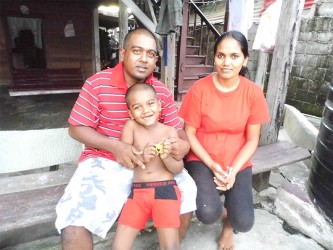
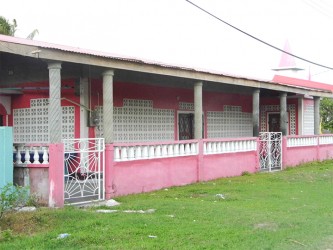
The village is smack between Goed Bananen Land and Gangaram. Its population is hard to determine. The Canefield-Enterprise Neighbourhood Democratic Council under whose jurisdiction the village falls, estimates the population to be somewhere around 300 people. However, NDC officials have confessed the figure is outdated and that they have no real way of knowing the true population of any of its villages because of non-existent record keeping.
Meanwhile, residents who live along the East Canje Public road that runs through the village, say there is an estimated 500 people. But by admission, they do not take into consideration the many villagers living through the streets and cross streets in Betsy Ground. So the 500 figure is challenged by the vast number of occupied houses in the streets and cross streets of the village. On the eastern half there is Kuldip Street while on the western half there is Sawmill Dam, Quentin, Frank, Bristol and Sookraj streets. As one resident put it, “We are crowded here, back then we had just the main road now we have several streets and other cross streets.” Consequently, Betsy Ground’s average population was given as 900 (or thereabouts).
87-year-old Richard Silvanus Oliver Goodluck, who recently re-migrated to Guyana and more specifically to his home community of Betsy Ground after spending some 62 years abroad, described the village he grew up in as “very good, beautiful, nice and sweet.” He added that the villagers were “united; we were one people.” But upon his return he was disheartened to observe the villagers are now “fragmented.” When asked to elaborate further, he said “politics got in the way. Persons aren’t as together as they were in the past.”
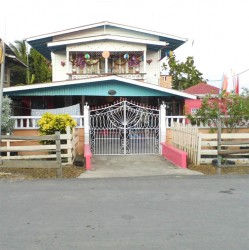
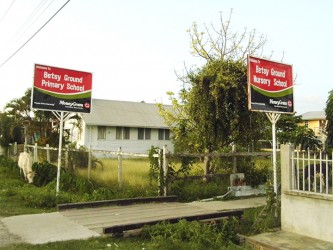
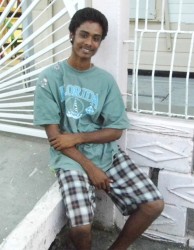
He nevertheless got re-acquainted with villagers and that was when he realized there “is a whole lot of poverty, plenty of poverty here in Betsy Ground. People are suffering here. Apart from sugar cane, there really isn’t anything here that brings them money.”
The face of Betsy Ground shows well-constructed concrete three and four bedroom houses. The body of the village, however, reveals one and two-bedroom crowded wooden houses. The state of affairs is such that the primary school there had to implement a daily feeding programme after teachers realized their pupils were not returning to school after the lunch break, and those who returned would often come without having eaten anything. Now with the help of a local church, the school ensures the pupils are fed a balanced diet regularly. To this end, a kitchen was established at the school.
Yvonne Osmanali, 38, born in Betsy Ground but migrated to Barbados and then returned home a few years back, had only glowing testimonu for her village. “In this area we get we own people that we know; nobody new, so everybody does live nice like family. We ain’t got no quarrelling; everybody living nice.” She recalled it was neighbours who greatly assisted her during the birth of her first child. “Is the neighbour Nurse Terry who really assisted me; check on me and ensure I was well taken care of at the hospital; from since I born, I reach neighbours living good.”
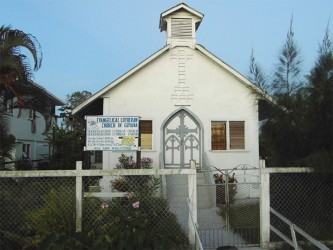
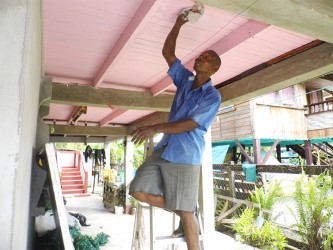
Ewart Chester, 60, was born and raised in Betsy Ground. When Sunday Stabroek stopped by he was in the midst of doing annual house cleaning. Upon hearing what the ‘World beyond Georgetown’ feature is about, he replied, “I’m one of those people who believe that Georgetown is Guyana.” Explaining, he said, “if I want a passport, I have to go to Georgetown to get it; if I want a birth certificate I have to go to Georgetown to get it; if I want a licence I have to go to Georgetown to get it. There is a limited world beyond Georgetown.”
Questioned about development seen in the village over the years, Chester said “there has been progress, but not much.” However, his wife Terry who was also in the yard doing chores during Sunday Stabroek’s visit added “we get good roads now, and street lights. Plus we don’t have so much crime as we use to.” To which her husband remarked, “It was the high crime rate that made them install street lights in the village.”
Their access to government is through the NDC in the neighbouring village of Goed Bananen Land. However, they seem not to care much for it. “All I do there, pay my rates and taxes when it’s due. I don’t make any suggestions about what work needs to be done in the villages,” stated Chester. Nevertheless, his wife interjected that “at least they clean the drains,” even as she noted it was a non-issue for her household owing to the fact that “around this corner, we clean our drains and parapets ourselves, so we don’t need the NDC.”

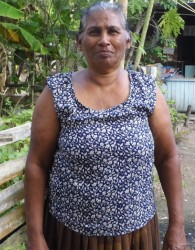
Disenfranchised, depressed and drugged out were words used to describe the village’s youths. According to the residents, the lack of job opportunities for those who would have furthered their studies and qualified themselves in various fields has severely affected the morale of the youths creating a syndrome where they have stopped trying and are now liming aimlessly on the road corners, with some becoming drug users.
Compounding the jobless state of the village’s youths is the fact that there are no nearby recreational facilities they can go to be meaningfully occupied. “All we got is a playfield in the neighbouring village; you get a set of youths that go there and run wild. They need guidance.” Moreover, according to Chester, the village is also plagued with “a lot of people who hang out at the [road] corners and smoke dope and molest people children when they passing. Sometimes when they stand up at the corner, you got to ask them for a pass if you want to go through the street. Most of them appear to be unemployed.”
To this his wife concurred. “We need the authorities to remove those persons who lime around the corner. I don’t know if they not working, but early in the morning I see them liming with bird cages in their hands and smoking.”
Meanwhile, a stop at the new supermarket for a bottle of water revealed that not all the youths roam aimlessly. In the absence of adults, Davena, 17, was found minding the family business with the assistance of two younger cousins. She disclosed that as a member of the Kirtan Hindu Mandir located in the village, she would normally participate in youth activities organized by the mandir’s youth body. Unfortunately, the youth group has not been active for the past two years, and thus most of her time and energy is spent helping to manage the family business, which she says was well received by the village. “Before, they use to go to J’s Supermarket in New Amsterdam or Mangru’s in Reliance (two villages away), but now that we are open, they can shop right here at Chenick’s Supermarket.”
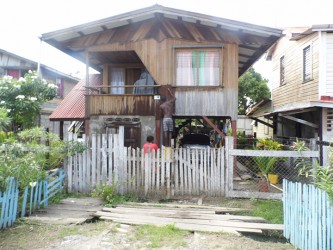
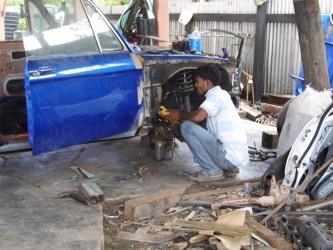
Further up, 21-year-old Kevin was seen liming in front of a shop. When approached he revealed he had only recently moved into the village and finds it to be “nice. There are a lot of nice people here.” The absence of recreational facilities does not bother him because his preferred form of recreation is “listening to music on my phone all day and all night.”
A native of Betsy Ground, 64-year-old Maharani said she doesn’t see anything in the village that needs improving. “We get light, water and telephone. No major crime, but we does get thieving and stuff.” She admitted though, she only stays within the parameters of her house (located on the main road) so couldn’t speak for what happens through the back streets. “I ain’t really know anything about the back street them because I don’t really go nowhere.”
However, she pointed out that the frequency with which vehicular accidents occur in the village needs to be addressed and remedied. “We get a lot of accidents. Only the other day we had an accident. The drivers be speeding and they need to be more careful.” This was illustrated during Sunday Stabroek’s visit, as two minor collisions occurred within minutes of each other.
Similar remarks as regards the number of accidents was made by another resident who gave his name as Gavin. He is curious to know if the authorities have a breathalyzer capable of determining if persons have more than just alcohol in their systems. “As a psychiatric nurse, I know is not all the accidents that happen here does be as a result of drinking; sometimes they does be smoking and using drugs.”
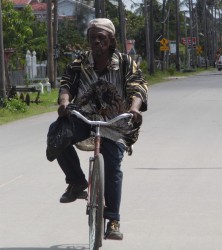
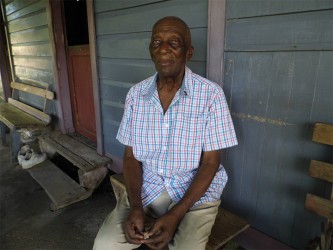
Cecil Quentin
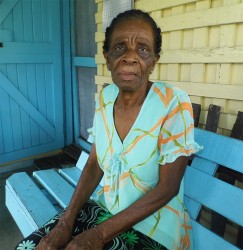
Mahendra Bhagwandin, who has lived in Betsy Ground with his family for 11 years, also spoke about the open use of drugs in the village. “They get one or two boys smoking on the street corner.” He opined, “There is need for a recreational ground. This village is the only one in this area that doesn’t have its own ground.”
A remarkable feature of Betsy Ground appears to be the longevity of its population. The oldest person in the village is said to be 95-year-old Rachael Michaels. However, there are several other persons who are in their late 80s and early 90s. One such person, 91-year-old Cecil Quentin noted it was quiet growing up in Betsy Ground. “When they had elections and plenty noise and fighting and so on, Betsy Ground was quiet. I got plenty friends, both Indians and Negroes.”
Quentin also mentioned he has never paid for potable water in his life. “We don’t pay for water, we get it free from the estate.” But he expressed concern that this may be a thing of the past and he as well as the villagers may soon find themselves paying to receive water. “The plot of land where the well is, was given to [the late] Desmond Hoyte [former president of Guyana] and he opened the well to residents. And the estate is running the well. But now they want to close the well down and hand it over to GWI and we will have to pay for water.” The well of which he speaks, is located in Gangaram and is being operated by GuySuCo. As such, water is provided free of cost to the residents of both Gangaram and Betsy Ground.
Home to two churches (Church of Christ and Lutheran), a Mandir and a nursery and primary schools, Betsy Ground is said to be named after a woman who bought the plantation (from Goldstone Hall to what is now known as Betsy Ground) in East Canje after Emancipation. According to the villagers, the woman called Betsy later sold the plantation.






